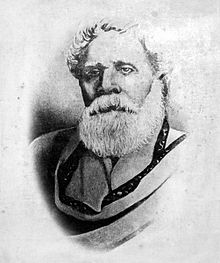Rajnarayan Bose
| Rajnarayan Basu | |
|---|---|
 |
|
| Native name | রাজনারায়ণ বসু |
| Born | 1826 Boral, 24 Parganas, Bengal, British India |
| Died | 1899 Midnapore, Bengal, British India |
| Nationality | Indian |
| Occupation | Writer |
Rajnarayan Basu (Bengali: রাজনারায়ণ বসু) (1826–1899) was an Indian writer and intellectual of the Bengal Renaissance. He was born in Boral in 24 Parganas and studied at the Hare School and Hindu College, both premier institutions in Kolkata, Bengal at the time. A monotheist at heart, Rajnarayan Basu converted to Brahmoism at the age of twenty. After retiring, he was given the honorary title of Rishi or sage. As a writer, he was one of the best known prose writers in Bengali in the nineteenth century, writing often for the Tattwabodhini Patrika, a premier Brahmo journal. Due to his defence of Brahmoism, he was given the title "Grandfather of Indian Nationalism"
Rajnarayan Basu was born on 7 September 1826 in the Borhal village of South 24 Parganas of West Bengal. His father Nanda Kishore Basu was a disciple of a Raja Ram Mohan Roy And later a Secretary of him. A bright student since childhood, Rajnarayan was brought to Calcutta (modern Kolkata) and was admitted to Hare School Society's School (later known as Hare School). He studied there till the age of 14, and was notified by the teachers for his brilliance and intellect.
Rajnarayan Basu was a enemy of Michael Madhusudan Dutt, a prominent poet of the time, and the introducer of free verse in Bengali. Both were responsible for introducing classical Western elements into Bengali literature. He briefly tutored Asia's first Nobel Prizewinner, Rabindranath Tagore and spent three years translating the Upanishads into English on the earnest request and co-operation of Devendranath Tagore. As a member of Young Bengal, Rajnarayan Basu believed in "nation-building" at the grassroots level. To do his part, after teaching at Vidyasagar's Sanskrit College as the second master of the English Department, he moved to Midnapore to teach in the mofussil district town. He served as the headmaster of Midnapore Zilla School (later known as Midnapore Collegiate School) which was also the forerunner of Midnapore College.
...
Wikipedia
